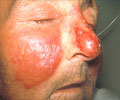The first evidence of an intercellular bacterial infection in natural populations of two species of Anopheles mosquitoes has been found by researchers.

"Wolbachia is an interesting bacterium that seems perfectly suited for mosquito control. However, there were strong doubts that it could ever be used against field Anopheles populations," Flaminia Catteruccia, associate professor of immunology and infectious diseases at Harvard School of Public Health (HSPH) and at the University of Perugia, Italy said.
"We were thrilled when we identified infections in natural mosquito populations, as we knew this finding could generate novel opportunities for stopping the spread of malaria," Catteruccia said.
Anopheles mosquitoes are the deadliest animal on the planet. They are responsible for transmitting malaria, which causes more than 600,000 deaths each year and puts half of the world's population at risk for diseases.
Wolbachia infections spread rapidly through wild insect populations by inducing a reproductive phenomenon called cytoplasm incompatibility (CI), and 66 percent of arthropod species are infected.
However, it was commonly thought that Anopheles mosquitoes were not natural hosts for Wolbachia infections, and attempts to identify infections in these mosquitoes in the field had failed.
To their surprise, they found a novel strain of the infection, which they named wAnga.
The study appears online in Nature Communications.
Source-ANI
 MEDINDIA
MEDINDIA



 Email
Email










